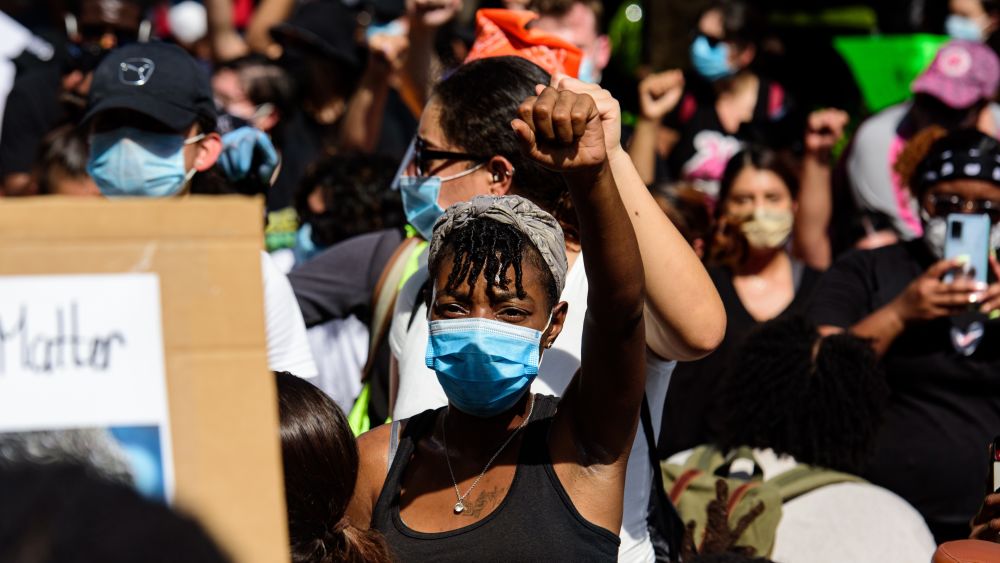Three Companies Who Have Been Fighting Racism Prior to 2020
- Ben + Jerry’s
- Nike
- Chobani
Table of contents
America has been forced to grapple with itself since George Floyd, a Black man, was killed by a White Minneapolis police officer on May 25. What started as a single protest in Minnesota has blossomed into thousands of vigils, marches, and national conversations surrounding the Black Lives Matter movement in a way that has felt both unique and historic. For the first time in the social media era, this national conversation found its way to corporate America.

Ben + Jerry’s
The Vermont-based ice cream company became one of the first large corporations in the United States to actively support the Black Lives Matter movement by writing an open letter to customers back in 2016. That the letter was signed by the company, and not just founders Ben Cohen and Jerry Greenfield, made it clear that the post was not a one-off. It seemed like a statement geared toward a real, lasting commitment rather than something written by a lawyer.
Four years later and the company seems to be doing just that. Ben + Jerry’s has prominent partnerships with Color of Change, Demos, The Dream Corps, and the North Carolina NAACP. There’s a section of the website that reads more like a library than the digital material of an ice cream company, full of educational articles ranging from Black Lives Matter to reparations to political campaign overspending. And last year, the company spent close to six figures on criminal justice reform.
There aren’t many examples of Ben + Jerry’s using its beliefs and activism to try and sell ice cream. The articles on the website aren’t used as direct marketing material or in advertising campaigns. It just seems to be what the company believes in, regardless of optics, and in that way, it has set a really strong roadmap for other corporations to follow in the coming years.
Nike
Always known for its advertisements, Nike decided to reignite a national conversation in 2018 by airing a commercial with Colin Kaepernick centered around the slogan, “Believe in something, even if it means sacrificing everything.” Two years later, it remains one of the highest-profile campaigns to come out in support of Black Lives Matter. At the time, Kaepernick, a former NFL quarterback who kneeled during the national anthem in 2016 to raise awareness of police brutality, was beginning to fade from the spotlight. He hadn’t played a game in two years and was avoiding interviews.
But his involvement in the commercial completely re-energized the national conversation about Kaepernick and what the quarterback was protesting in the first place. Nike faced blowback, of course, but the commercial ended up winning an Emmy and has been studied extensively as other brands try to find the fine line between capitalism and activism. Kaepernick remains unsigned by an NFL team but his impact and mission as a leader of the movement remain as clear as ever, in part due to his relationship with Nike.
It should also be noted that the commercial ran in the fall of 2018 after Nike created three roles earlier in the year that focused on diversity -- Manny Espinoza, Director of Global Strategy & External Relationships and Director of Diversity & Inclusion, Kellie Leonard, Vice President and Chief Diversity & Inclusion Officer, and Tamika Curry Smith, Vice President of Global Diversity & Inclusion.
Chobani
Not many yogurt companies publish yearly sustainability reports, but not many yogurt companies are like Chobani. Founder and CEO Hamdi Ulukaya has long been on the forefront of equal opportunity employment, as he’s focused on staffing refugees both in manufacturing and corporate positions since he launched the company in 2007. According to Ulukaya, companies have a responsibility to help solve the global refugee crisis by hiring good workers who might’ve slipped through the cracks due to factors completely out of their control, such as racism and global unrest.
The commitment to this philosophy has caused Ulukaya to receive death threats, but Chobani has not backed down. While diversity and inclusion has been one of the company’s north stars of the future, in its 2019 sustainability report, Chobani doubled down on this philosophy. The world’s most socially active yogurt company has committed to “unconscious bias training for all Chobani employees and programs that foster greater diversity and inclusion within management positions by 2022.”
--
Get the latest tech, business & company news from The Org. Join our weekly newsletter by creating a free account here.
In this article


The ORG helps
you hire great
candidates
Free to use – try today


